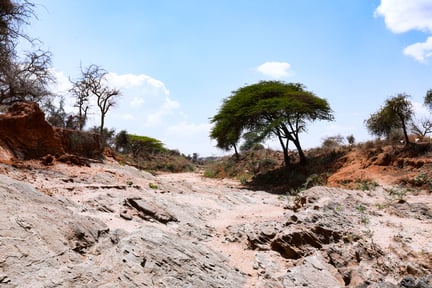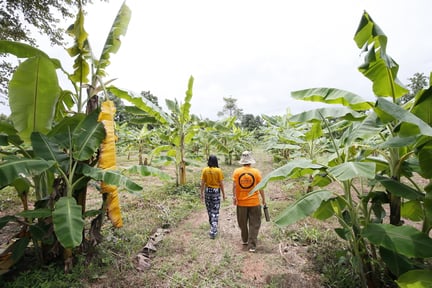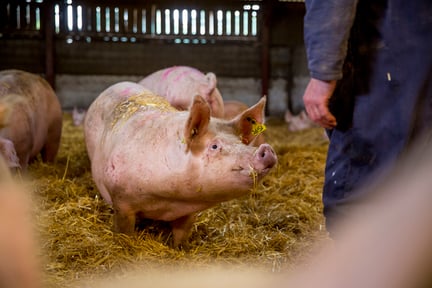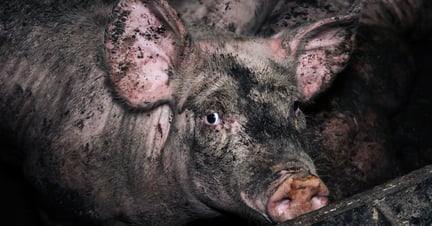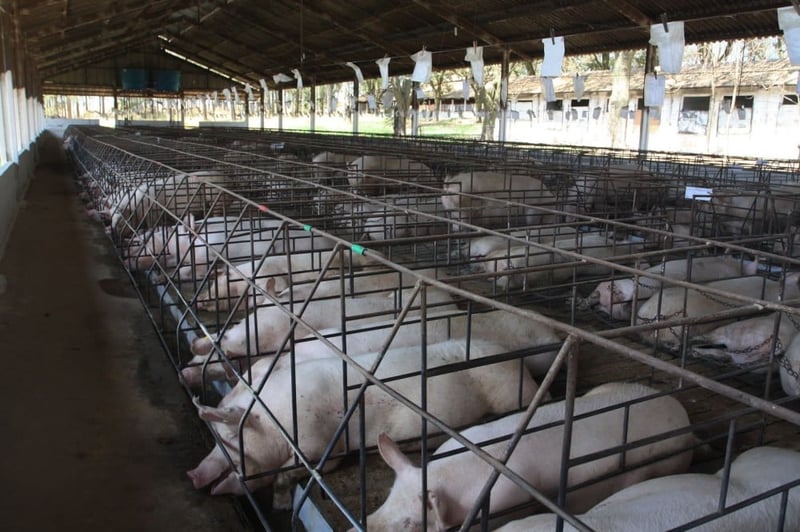
COP30 fails animals and the Amazon as 'Big Ag' escapes scrutiny
Press release
World Animal Protection urges a global move from industrial animal farming as COP30 concludes in Belém, calling for sustainable food systems.
Belém, Brazil - World Animal Protection today issued an urgent demand to shift our food systems away from industrial animal agriculture, following the conclusion of COP30.
The Belém Political Package agreed to develop a just transition mechanism, but there was insufficient progress elsewhere on vital issues such as implementing a roadmap to end deforestation, or a phase out of fossil fuels including in the agricultural sector.
COP30 has been dubbed the 'COP of truth', yet a truth not being acknowledged is we cannot tackle the climate crisis while turning our back on the destruction and suffering caused by industrial animal agriculture.
For a COP hosted in the Amazon, it's shattering that deforestation took a back seat. The wildlife, indigenous people and traditional communities who call the forest their home deserved better than this.
We are pleased to see an emerging recognition of food systems in the negotiations as well as in in the Belem Declaration on Hunger, Poverty and Human-Centred Climate Action. It's positive to see recognition in the text of the role of small-scale farmers, however it's concerning there is no mention of animal welfare, when the health of animals and our environment are so importantly intertwined.
Although closed door negotiations provided little room for civil society, COP30 gave the opportunity for movements supporting animals to have their voices heard, from outside protests directly calling out big agribusiness, to official events where we demonstrated the power of food systems that reduce emissions, are kinder to animals and support small scale farmers.
The Belem Political Package falls short of what animals, people and planet need to thrive. It fails to acknowledge that agriculture is the major driver of deforestation, and that cutting down our forests is supercharging emissions.
A failure to address the root cause - industrial animal agriculture
Agriculture is the second largest source of global climate emissions after fossil fuels, yet COP30 failed to address this critical sector adequately.
"Industrial animal agriculture is not only a leading cause of emissions, but a major driver of deforestation, causing wild and farmed animal suffering.
'Equitable, humane and sustainable farming practices must replace the destructive industrial agriculture model. These solutions not only address the climate crisis but also stop the suffering of billions of animals trapped in factory farms," Ms Dent said.
Big ag's stranglehold on the climate debate
A recent investigation from DeSmog and the Guardian found that over 300 industrial agriculture lobbyists attended COP30.
"Big ag" won at COP30, while wildlife and farmed animals were once again reduced to commodities and excluded from the climate conversation.
Agribusiness giants like JBS are driving deforestation, animal cruelty, and emissions, yet they had a VIP seat at the COP30 table. These companies are not climate champions, they are breaking the planet, and wildlife, farmed animals and communities are the collateral damage.
The UNFCCC must act decisively to cut big ag's influence if it hopes to salvage credibility ahead of COP31 in Türkiye' Ms Dent said.
A call for ambitious, strong leadership at future COPs
Despite the lack of animal protection measures in the final texts at COP30, World Animal Protection is resolute in its mission to drive meaningful change for animals. The global animal welfare non-profit will continue to push for a just transition to food systems that protect animals.
"At COP31, governments must support a just transition away from factory farming, toward equitable, humane and sustainable food systems. Governments need to recognise the way we treat animals is connected to our fight against climate change. Climate action cannot be just about humans, because when animals and ecosystems suffer, the outcomes for people are diminished.
"World Animal Protection will keep standing up for wildlife and farmed animals until their voices are included in UNFCCC negotiations, and until it is widely acknowledged that animal welfare is inseparable from the health of our planet," Ms Dent said.
NOTES TO EDITORS:
For more information about World Animal Protection at COP30, and to arrange interviews with our experts on the ground in Belém please contact:;
Communications Manager, Hannah Smart at hsmart@worldanimalprotection.org.au or via WhatsApp on +61 0434 269 048.
World Animal Protection is the global voice for animal welfare, with more than 75 years' experience campaigning for a world where animals live free from cruelty and suffering. Our work to protect animals will play a vital role in solving the climate emergency, the public health crisis, and the devastation of natural habitats.Through our global food system strategy, we will end factory farming and create a humane and sustainable food system that puts animals first. By transforming the broken systems that fuel exploitation and commodification, we will give wild animals the right to a wildlife.
Related content
World Animal Protection Climate Change Hub
Discover everything that World Animal Protection is doing to tackle the climate crisis and what you can do to help.
Conference of the Parties (COP) Guide
Learn about the Conference of the Parties (COP) and how World Animal Protection advocates for animals in global climate and biodiversity discussions. Take action today!
Just Transition In Food Systems
Discover why a just transition is essential to end factory farming, protect animals, and build sustainable food systems that tackle climate change.
